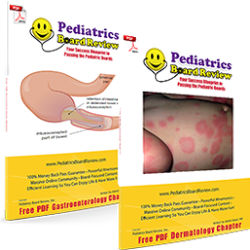Need A Pediatric Board Study Plan?
Creating a Pediatric Board Study Plan is Essential for Success in the Pediatric Boards

One question I get asked all the time is, “Can you give me a pediatric board study plan?” It’s a great question—and I love it when people ask because it means they’re being proactive. Having a strong, structured study plan is absolutely critical for passing the pediatric boards.
I've been through this journey myself, and I know how overwhelming it can be. When I first took the boards, I didn’t fully understand what it would take to pass, and my score reflected that. The passing score was a 410, and I scored 370. I felt crushed. But the next time, with a plan and some key changes in my approach, I scored a 540. Having a strong study plan resulted in a 40% increase in my score.
That experience taught me exactly what it takes to get a passing score. Everything I learned from my journey went into building the Pediatrics Board Review (PBR). Having helped pediatricians pass on their first attempts, and even on their tenth and eleventh attempts, I can confidently say that there’s truly nothing like PBR on the market. Our data suggests that PBR helps more than 98% of first-time test takers pass the initial certification exam.
If you're preparing for the pediatric boards, this article will guide you through a pediatric board study plan designed to set you up for success. Here’s how to create a study plan that works for you, whether it’s your first attempt, you're working full-time, or you've had a challenging experience with the boards in the past.
STUDY PLAN BY 4 GENERAL CATEGORIES

To succeed, you need to start by figuring out how much study time you’ll need based on your situation. Then, you have to block off that time in your calendar.
Preparing for the boards will require a LOT of dedicated study hours, so it’s essential to carve out the necessary time in advance. Balancing work and personal life with the demands of study time is the biggest challenge, so here’s how to approach your study plan based on where you’re at in your career:
Are you taking the boards for the first-time?
If you're fresh out of residency, you’re in a strong position: statistics show that first-time test takers have the highest pass rate. The clinical knowledge and exam skills you’ve built are fresh, which gives you a clear advantage. My advice is to take full advantage of this time, without taking on too many additional responsibilities if possible.
Here are a few key tips for first-time test takers:
- Consider Part-Time Work: If you can avoid a full-time position until after your exam, go for it. Working part-time not only reduces burnout but also gives you more flexibility in your study schedule.
- Request an Easier Rotation: For those of you in fellowship, request a less demanding rotation schedule in your first summer. An easier rotation frees up more time to focus on board prep.
- Time Commitment: A realistic goal for low-risk first-timers is to set aside 300 hours of study time. Those who are moderate to high-risk should plan on setting aside at least 500 hours of study time. This time includes thorough review sessions with your core study material and regular practice questions.
Are you already in private practice?
For those of you in private practice, finding the time to study is often even more difficult. Trust me, I know how busy life can get, especially when you’re balancing patient care, family, and other responsibilities. When I passed, I made the critical decision to invest in heavy studying during my weeks off leading up to the exam, and it was a game-changer.
Here’s my best advice if you’re currently in practice:
- Take Time Off: I can’t stress enough how important this is. Ideally, I’d recommend 4-6 weeks off during the final two months leading up to your exam. Taking that time to study without interruption is one of the most effective things you can do. If you can’t take that much time off, then aim for 2 weeks off if you’re a low-risk test-taker and 4 weeks if you’re a moderate to high-risk test-taker.
- Study Hours: Use the PBR risk calculator to get a risk profile. Then, set aside 300 or 500 hours of board preparation time based on your risk profile. Give yourself room to not only review the material but also actively engage with it. Make it stick.
- Plan With Your Family and Team: Get family and colleagues on board with your study goals. Let them know about your study plan and the hours you’ll be dedicating so they can support you in protecting your time.
Have you ever failed the pediatric boards?

If you’ve experienced the disappointment of failing the boards, you’re not alone—I’ve been there myself, and I know how hard it is to bounce back. After my first attempt, I felt discouraged, frustrated, and embarrassed. But that experience shaped my approach and was the inspiration behind creating PBR. And here’s what I want to tell you: you can absolutely pass the boards, even if it didn’t happen on your first, second, third, or even your tenth try.
For repeat test-takers, here are a few essential steps:
- Take as Much Time Off as Possible: Take at least one to two days off per week for dedicated study, then take at least four out of the final six weeks before your exam entirely off. During my successful retake, I put in close to 500 hours, and that extra time made all the difference.
- Build a Support Network: If you haven’t already, seek out a study group, a coach, or a supportive family member who can help keep you motivated. PBR’s private online community is here for you, too.
- Focus on PBR’s High-Yield Content: Keep your resources simple and focused. Going over the PBR material about five times is a good benchmark for most, and I recommend adding an extra 50 hours of question-answering practice to really solidify your test-taking strategies. These techniques can be life-changing when you’re in the actual test environment.
Test-Taking Strategy Students
Everyone taking the boards should work on having good test-taking strategies. Our PBR Test-Taking Strategy courses were designed with moderate and high-risk test-takers in mind since they are often aware that they are intelligent, but perform poorly on standardized exams. Many pediatricians in these courses have failed some type of board exam in the past, and the courses address the unique challenges that come with that experience.
- Intensive Question Practice: On top of your core study time, add about 50 hours of dedicated question-answering practice. The course’s strategies can make a profound difference, helping you focus on navigating the questions themselves rather than getting bogged down by content.
- Repetition is Key: Aim to go through at least a hand full of practice questions daily to build and maintain the skill of test-taking strategy.
The Biggest Mistake You Can Make: Dividing Your Time Between Multiple Resources
One of the most common mistakes I see among pediatricians studying for the boards is trying to juggle too many resources. This approach usually leads to overwhelm, lack of focus, and sometimes burnout. When I failed the first time, I was guilty of this myself, thinking that more information would mean better preparation. In reality, it only created more noise.

If you’re like most pediatricians, you’re busy juggling many responsibilities and trying to make the most of limited time. My advice is to choose ONE trusted resource and make it your foundation. I created the PBR study guides with this in mind, making them as high-yield as possible, so you don’t waste time on non-essential material. Stick with one trusted resource, and know it inside and out. PBR alumni will share with confidence that PBR has all the information you need to not only pass, but to score above the national average, like I did on my second attempt. That’s also why I offer a 100% Money Back First-Time Pass Guarantee to our members.
Focus, Focus, Focus!
Once you feel you’ve memorized every little detail in PBR’s Core Study Guide and Q&A book, then, and only then, do I suggest venturing into additional resources if you really want to. But I promise, there’s more than enough high-yield content in PBR to carry you through the exam. Focusing on one resource isn’t just practical—it’s often the difference between passing and failing.
Creating a Study Schedule That Works for You
Finally, here’s brief overview of how to translate all of this into an actual schedule. When planning your study time, think about your lifestyle and other obligations. Whether you’re a first-time test-taker, working full-time, or have had previous setbacks, it’s essential to create a pediatric board exam study schedule that’s realistic and fits your life.
- Set Weekly Goals: Break down your hours by week, and make sure each session has a start and end time. Have specific amounts of time dedicated to going through your core study content, and specific amounts of time dedicated to developing and maintaining your test-taking skils.
- Create Study Rituals: Having a consistent routine or study ritual will make it easier to stick to the plan. This could be as simple as always studying at the same time each day, setting up a specific workspace, or doing a quick five-minute meditation before you begin.
- Evaluate and Adjust: Every week, review your progress. Are you staying on track with your hours? Do you need to adjust based on your retention or understanding? Are you engaging in distractions to avoid studying? Adjust as needed to stay focused and committed to your end goal.
Final Thoughts
Preparing for the pediatric boards is a marathon, not a sprint. But with a well-thought-out plan, a strong foundation, and focused resources, you WILL pass the boards—even if it didn’t happen on your first try. Remember that PBR is here to support you, and you’re not in this alone.
If you are serious about maximizing your chances of passing, consider leveraging all that the Pediatrics Board Review (PBR) has to offer. PBR provides a system of high-yield, strategically designed resources, from concise study guides to comprehensive test-taking strategy courses. Founded by me, Dr. Ashish Goyal, PBR has helped thousands of pediatricians successfully navigate the boards.
Contact my team today to find out how we can help you on your path to getting board certified!
Pediatrics Board Review is your all-in-one service designed for pediatricians by a board-certified pediatrician. Dr. Ashish Goyal has been helping pediatricians pass their initial certification exams and maintenance of certification exams since 2011. Have questions? Click here to contact our team for answers.



